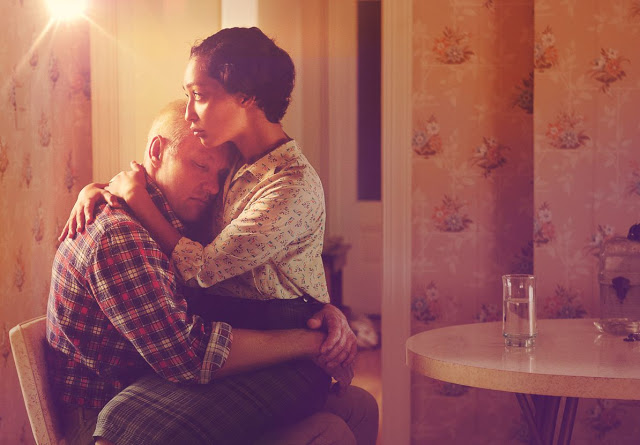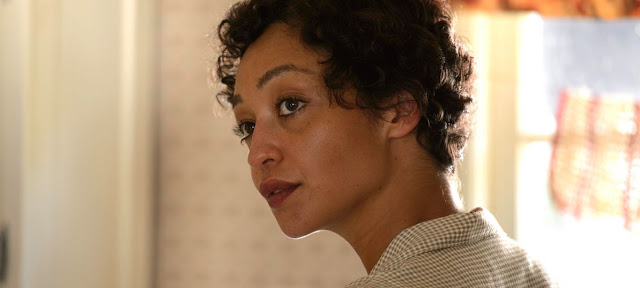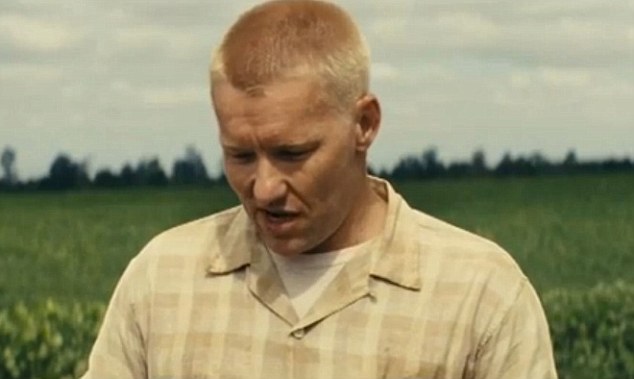Loving is a very pleasant American movie about a very unpleasant time in American history. It tells a story of adversity, perseverance, and ultimate triumph, and it proceeds in a rigorous straight line, with minimal eccentricity or embellishment. This is perhaps to be expected, given that Loving belongs to a specific subgenre: the earnest and well-meaning docudrama. But it is also something of a surprise, given that its writer and director is Jeff Nichols, whose previous films (Take Shelter, Mud, Midnight Special) were largely off-kilter and opaque. Nichols tends to focus on odd protagonists—a delusional laborer, a wandering gangster, an alien boy—but even more central to his filmmaking are his disdain for convention and his gift for unpredictability. Yet anyone with access to Wikipedia could comfortably predict how Loving will play out.
This does not make it bad. On the contrary, it can be satisfying to watch a familiar story unfold on screen, particularly when it is well-told and well-acted. And of course, the movie’s theme—that stoic decency can defeat senseless bigotry—is a worthy one, equally relevant now as when the events of the film took place. Still, the challenge for Nichols is to make Loving stimulating as a piece of cinema as well as a lesson in history. Given his meat-and-potatoes approach to this material, it’s a marvel that he even half-succeeds.
Loving opens in 1958, with Mildred Jeter (Ruth Negga), telling her boyfriend, Richard Loving (Joel Edgerton, who starred in Midnight Special earlier this year), that she’s pregnant. His characteristically succinct response: “Good. That’s real good.” Their romance is generally happy—they are untroubled by the disapproving looks that they occasionally receive from others—and when Richard proposes shortly thereafter, Mildred says yes without hesitation. The catch: Mildred is black, Richard is white, and miscegenation is illegal in their home state of Virginia. Undaunted, they travel to Washington, D.C., to get married. But when they return, those judgmental looks acquire the actual judgment of the law.
As it turns out, Virginia may be for lovers, but it isn’t for the Lovings. The couple is arrested and threatened with imprisonment; they are only spared jail thanks to some hasty lawyering from a local attorney (played by The Night Of‘s Bill Camp, who also had a bit part in Midnight Special). Instead, as a condition of their guilty plea, they are banished from the state of Virginia and are forbidden to reenter together for the next 25 years.
Crazy, right? But this actually happened, and one of Nichols’ achievements is the way he illustrates the terrifying normalcy of racism as it existed in the Jim Crow South. The local sheriff (Marton Csokas, very good) views Richard with an appalling combination of disgust and pity, theorizing that this traitorous white man just doesn’t know any better. The judge (David Jensen, also from, wait for it, Midnight Special) is mystified that two adults could so brazenly violate not only the laws of Virginia, but those of God. Even the Lovings’ lawyer seems reluctant to serve his clients, angling to minimize their punishment rather than even attempting to argue that their behavior is in no way criminal.
Fortunately for the Lovings, there is the ACLU, personified here by a pair of youthful, energetic, not entirely confident attorneys: Bernard Cohen (Nick Kroll, keeping a lid on his comic persona) and Phil Hirschkop (Jon Bass). And the majority of Loving functions as a legal procedural. It follows the winding pathway that transformed the Lovings from an anonymous couple into a cause célèbre for the civil rights movement, as their lawsuit against Virginia eventually lands in front of the U.S. Supreme Court. (In a bleakly comic moment, Cohen advises the Lovings to return to Virginia and get re-arrested in order to give them standing to appeal, a proposal that Richard dismisses within nanoseconds.)
As a matter of history, this is undeniably significant—the Lovings’ case was cited just last year in the landmark Supreme Court ruling that affirmed the right to gay marriage—but it does not necessarily make for great drama. (The law, as any lawyer will tell you, can be spectacularly dull.) And assuming (perhaps charitably) that contemporary audiences need not be convinced of the vileness of anti-miscegenation laws, Loving‘s message of tolerance is only valuable up to a point. No, for Loving to justify its existence beyond mere didacticism—for it to work as a movie—it needs to accomplish something trickier: It must reveal its protagonists as people rather than symbols.
It does its best. But while Loving strives to articulate the intimate, human costs of state-sanctioned prejudice, it never quite transcends its hagiographic template. The nuance that it does possess is due primarily to its two lead actors. Negga, a firebrand on AMC’s Preacher, portrays Mildred as both generous and persistent, a patient woman who is nevertheless willing to put up a fight. But it is Edgerton who provides Loving with its feathery poignancy. His Richard is a gruff, soft-spoken man who just wants to be left alone, and Edgerton lends him a simmering swirl of anger, guilt, and pride. When Cohen asks Richard if there’s anything he’d like to say to the Supreme Court, his one-sentence reply is utterly perfect. What else is there to say?
And really, what else is there to say about Loving? As a survey of an important legal and political event, it’s educational and inspirational. As a movie, it’s heart-warming, well-intentioned, and rather bland. By faithfully conveying the Lovings’ story, Nichols has made a gentle, unassuming film that’s virtually impossible to dislike. But as Richard and Mildred would surely attest, like isn’t quite the same thing as love.
Jeremy Beck is the editor-in-chief of MovieManifesto. He watches more movies and television than he probably should.



